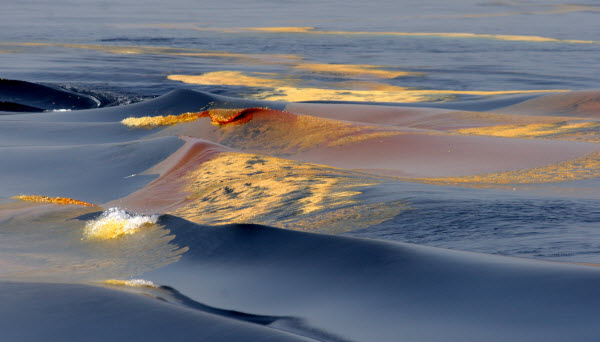Search
Recent comments
- crummy....
6 hours 1 min ago - RC into A....
7 hours 54 min ago - destabilising....
8 hours 58 min ago - lowe blow....
9 hours 30 min ago - names....
10 hours 7 min ago - sad sy....
10 hours 32 min ago - terrible pollies....
10 hours 42 min ago - illegal....
11 hours 54 min ago - sinister....
14 hours 16 min ago - war council.....
1 day 1 min ago
Democracy Links
Member's Off-site Blogs
out of sight, out of mind .....

from Crikey
West Atlas spill the tip of the iceberg: WWF
Conservation director for the World Wildlife Fund Gilly Llewellyn writes:
The fire on the West Atlas oil rig platform is out and the first stage of plugging the leak is completed. But this is not the end of the story.
We need to find out what went wrong and further, improve the regulations that have allowed the untrammeled exploitation of one of the worlds last great marine wildernesses.
The north-west marine region of Australia is an extraordinarily rich area that contains one of the world's largest humpback whale nursery, is the migration pathway and home for many species and is the last bastion for many animals no longer found on mainland Australia.
In terms of the environment, this region is easily as important as the Great Barrier Reef.
Unfortunately, it sits on huge reserves of oil and gas and every year resource companies are given permission to exploit more of the region, including PTTEP Australasia.
Unbelievably, in the middle of the West Atlas oil spill, PTTEP entered into negotiations to buy a further US$35 million worth of exploration blocks off the north-west coast. The deal is subject to government approval and is expected to be finalised by the end of November.
It would be astonishing if the government even contemplated giving approval for further development without first investigating the cause of this oil spill. Surely it must determine whether the company has been following correct procedures before giving it another license to drill.
It makes sense that the government should not approve any further developments of this type by any company in such a sensitive, vulnerable and pristine tropical marine habitat until the inquiry is completed.
Time will tell whether such a common sense approach will prevail given that resources always seem to take precedence over the environment in the north-west.
The region's distance from the population centers of the east coast has allowed it to come under a sustained environmental attack that would never be permitted even close to a similar region if it existed on the east coast.
A case in point is the Gorgon plant's massive expansion on Barrow Island, which was permitted despite there being far more environmentally sound options. The LNG expansion could have been located on the mainland. But now a reef will be dredged, the nesting grounds of endangered turtles will be threatened and rare species found only on this island will come under further pressure because it is a cheaper option for the company.
Coupled with Western Australia's half century-old environmental legislation, the power of multinational resource companies, the Federal Government's desperate need to inject money back into the economy and north-west Australia's distant location the remarkable natural wonders of this region are coming under increasing pressure as resource companies scramble to access the mineral resources.
That's why there must be an inquiry into this spill that has powers similar to the Cullen inquiry into the Piper Alpha disaster in UK or the Longford Royal Commission in Australia.
Its terms of reference must extend beyond the West Atlas incident but also look at the regulations that have allowed this region to be exploited with so little care for the environment.
- By John Richardson at 5 Nov 2009 - 6:17am
- John Richardson's blog
- Login or register to post comments
leftovers .....
out to lunch .....
from Crikey.....
Former Adelaide Advertiser journalist Bruce Hogben writes
Flying fish frightened by our cruise ship emerge from the muck, their fins/wings leaving odd zig-zag trails across the stained water to where they plop back into it, probably blinded by the chemicals.
It's sickening to think what must be happening to the marine life in Australia's once pristine northern waters now polluted over vast areas stretching from Exmouth in Western Australia to Queensland's Gulf of Carpentaria. And where are the birds? I did not see any sea birds from Exmouth until we reached the Gulf waters, as meanwhile over three days my camera recorded the pollution -- slicks stretching to the horizon.
Is it all from the 10-week Montana oil rig leak finally plugged on November 2 or 3, days after a massive fire broke out on the PTTEP Australasia rig, 690 kilometres west of Darwin in the Timor Sea? Or are there more leaks that we are never told about? As Dawn Princess cruised up the WA coast at a steady 19 knots, I was amazed to see how many oil rigs are out there.
PTTEP claimed the well lost about 400 barrels a day (for 10 weeks) but some observers have estimated a flow up to 2000 barrels a day. And now we have toxic oil pollution visible over thousands of square kilometres of the Indian Ocean, Timor Sea and Arafura Sea.
The federal government has promised us a full and independent inquiry, but the damage is done. And nothing can guarantee it will not happen again. Cyclones sweep through this vast area every year.
A recent report in Crikey complained that the media had largely ignored or downplayed this horrifying event. I am from Adelaide, where The Advertiser demonstrated this with its report that the rig had caught alight -- three paragraphs buried deep in the newspaper. Pathetic. Apathetic.
The cruise ship is circumnavigating Australia, having left Melbourne on November 18. We are due to dock in Brisbane on Tuesday.